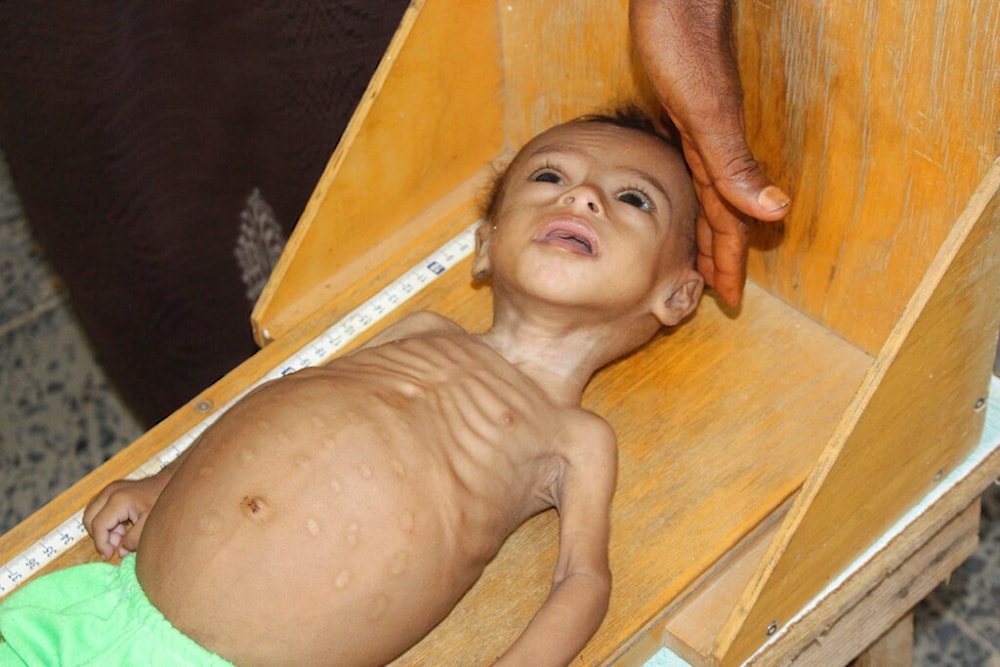MSF warns of rising malnutrition in Yemen amid funding cuts
Between January 2022 and December 2024, MSF-supported facilities treated 35,442 malnourished children under the age of five across five governorates: Amran, Saada, Hajjah, Taiz, and Hodeidah.
-

In this Sunday, June 14, 2020 photo, seven-month-old Issa Ibrahim Nasser is measured at a clinic in Deir Al-Hassi, At seven months old, Issa weighs only three kilos. Like him, hundreds of children suffer from acute severe malnutrition because of poverty and grinding conflict. Yemen. (AP Photo/Issa Al-Rajhi)
The humanitarian organization Médecins Sans Frontières (MSF) has issued a stark warning about rising malnutrition rates in Yemen, stating that current treatment capacity is overwhelmed as needs continue to grow. The crisis has been exacerbated by punitive reductions in humanitarian funding, leaving millions at risk.
Between January 2022 and December 2024, MSF-supported facilities treated 35,442 malnourished children under the age of five across five governorates: Amran, Saada, Hajjah, Taiz, and Hodeidah.
A newly released MSF report, Yemen's Rising Tide of Malnutrition: Seasonal Trends 2022-2024, details the severity of the crisis. Many children are arriving at health facilities in critical condition, often suffering from complications like measles, cholera, and acute watery diarrhea.
"Children are arriving in increasingly critical condition. People can no longer wait for help that simply isn't coming fast enough," said Himedan Mohammed, head of MSF Middle East operations.
Health System on the Brink
In 2024, peak malnutrition season pushed MSF-supported inpatient therapeutic feeding centers (ITFCs) beyond their limits. At Abs Hospital in Hajjah governorate, the bed occupancy rate soared to 200% in September and 176% in October—the highest in six years.
Families face significant barriers to accessing healthcare. A mother who traveled two hours to bring her malnourished infant daughter to Al-Salam Hospital in Amran shared her struggle: "With only one breadwinner in our family of 12, we can barely meet our daily needs, and the nearest health centers don't have specialized departments to treat malnutrition."
Read more: Sources: Yemen barred from WFP aid over Palestine support - Exclusive
Humanitarian Funding Cuts and Escalating Hardship
The prolonged war on Yemen has crippled its economy and healthcare system, with 83% of the population now living in multidimensional poverty. Humanitarian aid suspensions and reductions have further intensified the crisis.
According to World Health Organization (WHO) data from April 2024, nearly 46% of Yemen's health facilities are either partially functional or completely out of service.
MSF is calling for immediate action to prevent the crisis from worsening: "If we don't act now by boosting nutrition programs, ensuring affordable transport to health facilities, and bringing care closer to people in need, then we risk an even greater surge of malnutrition in the months ahead," said Mohammed.
MSF is urging donors, the Yemeni Ministry of Health, and international organizations to step up efforts, particularly in expanding food distribution programs for children and pregnant/lactating women, restoring health infrastructure to ensure treatment is accessible, and increasing community-based vaccination efforts to curb preventable diseases.
Our teams treated over 35,000 malnourished children in facilities we support in Yemen from 2022 to 2024.
— MSF International (@MSF) March 19, 2025
Healthcare facilities are overwhelmed & food assistance is suspended or reduced.
We call for an urgent response as admissions remain alarmingly high.https://t.co/sAwoOB12Yv

 3 Min Read
3 Min Read








